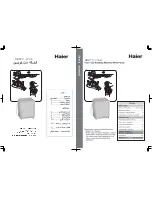
5
3.
Using pliers, squeeze the ears of the spring clamp
and position the clamp so the clamp ears align with
and contact the tabs on the drain hose. This assures
proper location of the clamp to prevent leaks.
INSTALLATION
Leveling the Washer
Excessive noise and vibration can be prevented by properly
leveling the washer.
1.
For free standing installation and with the washer in it’s
final position, place a level on top of the washer. Adjust
the leveling legs so the washer is level front-to-rear and
side-to-side, and stable corner-to-corner.
Press down on alternate corners and sides and feel for the
slightest movement. Adjust the appropriate leg so the
washer is SOLID on the floor on ALL four legs. Keep the
leveling leg extension at a minimum for best performance
of the washer.
2.
For pedestal installations, See additional installation
instructions included with the pedestal.
Washer Connections
1.
Run some water from the hot and cold
faucets to flush the water lines and
remove particles that might clog up the
water valve screens.
2.
Remove the inlet hoses and rubber
washers from the plastic bag located in
the drum of the washer and install the
rubber washers in each end of the inlet
hoses.
3.
Carefully connect the inlet hose marked "HOT" to the
outside "H" outlet of the water valve. Tighten by hand, then
tighten another 2/3 turn with pliers. Carefully connect the
other inlet hose to the inside "C" outlet of the water valve.
Tighten by hand, then tighten another 2/3 turn with pliers.
Do not crossthread or over-tighten these connections.
4.
Connect the inlet hose ends to the HOT and COLD water
faucets tightly by hand, then tighten another 2/3 turn with
pliers. Turn the water on and check for leaks.
NOTE:
Use only new hoses.






























